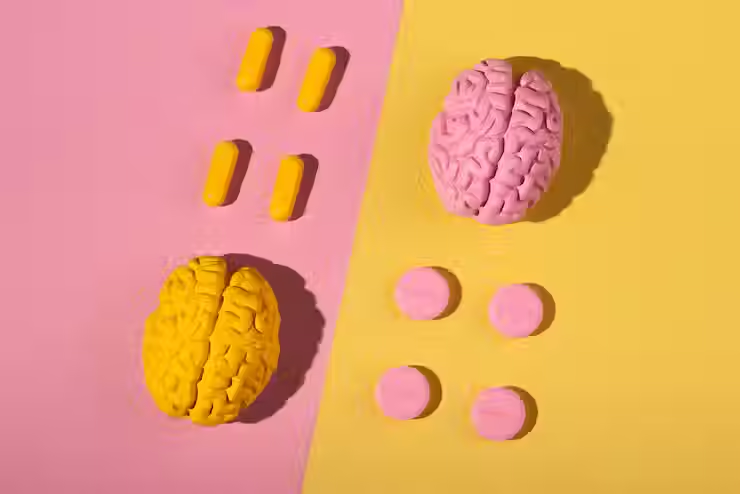Unlocking your best you: How Nootropics and Adaptogens Support Everyday Wellness
- Wild Spirit Life

- Apr 24
- 4 min read

Modern life asks a lot of us. From back-to-back notifications to demanding workdays, emotional juggling, and poor sleep, we’re often left depleted — not just physically, but mentally and emotionally too. The wear and tear on the mind is real. And while rest, movement, and time in nature are essential, there’s a growing understanding that certain natural compounds, namely nootropics and adaptogens can help support our ability to feel more present, more focused, and more resilient in our everyday lives.
The Daily Drain: Why Mental Clarity is Harder Than It Should Be
You don’t need a diagnosis to feel it: the fog, the short fuse, the forgetfulness. Whether it’s from poor sleep, emotional strain, or chronic busyness, our brains are constantly reacting to stress.
According to the American Psychological Association, chronic stress is not only linked to anxiety and poor sleep, but also reduces cognitive performance, particularly in areas like memory, decision-making, and concentration. Stress increases cortisol, a hormone designed to help us survive danger, but when elevated for too long, it begins to erode the very clarity we need to thrive.
And when the brain’s natural energy reserves are stretched thin, burnout isn't far behind. We’re not just tired, we’re unmotivated, emotionally flat, and often more disconnected from the life we want to live. This is where holistic support, both physical and mental becomes vital.

What Are Nootropics?
Nootropics (sometimes called "smart drugs" or cognitive enhancers) are natural or synthetic compounds that support mental performance, particularly in focus, memory, motivation, and overall brain function. Unlike stimulants, true nootropics are designed to support the brain without causing jitteriness, dependency, or harsh crashes. Some of the most reliable and time-tested nootropics include:
L-Theanine (found in green tea): Enhances alpha brain waves, promoting calm focus. Studies show it can help reduce stress without sedation — ideal when paired with caffeine for smoother alertness.
Lion’s Mane Mushroom: This adaptogenic fungus has been shown to stimulate nerve growth factor (NGF), supporting brain plasticity and memory. In a 2009 study published in Phytotherapy Research, older adults taking Lion’s Mane showed significant cognitive improvement over 16 weeks.
Bacopa Monnieri: An herb used in Ayurvedic medicine for centuries. Clinical trials have demonstrated its ability to enhance memory retention and reduce anxiety over time.

What Are Adaptogens?
Adaptogens are natural substances that help the body adapt to stress, regulating hormonal balance, energy, and immune response. While nootropics primarily support cognitive function, adaptogens target the underlying stress response, making them an ideal daily ally in a high-pressure world.
A few of the most impactful include:
Ashwagandha: Known for its ability to reduce cortisol and support emotional resilience. A 2012 study published in the Indian Journal of Psychological Medicine showed that participants taking Ashwagandha experienced a 44% reduction in stress levels over 60 days.
Rhodiola Rosea: Used traditionally in cold climates to fight fatigue, Rhodiola enhances mental stamina and mood. It helps reduce the mental fatigue associated with long-term stress and improves focus and endurance.
Holy Basil (Tulsi): Revered in Ayurvedic tradition for promoting balance, Tulsi helps regulate blood sugar and cortisol, supports clear thinking, and enhances mood stability.

How These Tools Can Support Everyday Wellness
The goal with nootropics and adaptogens isn’t to “hack” your brain. It’s not about becoming superhuman. It’s about supporting the natural rhythm of your mind and body so you can feel more like you — focused, creative, calm, and connected.
For example:
Starting your day with a Lion’s Mane and Rhodiola blend may give you gentle, sustained clarity.
A mid-afternoon cup of Ashwagandha tea can help bring down the day’s stress without sedating your energy.
L-Theanine paired with green tea is a wonderful alternative to high doses of caffeine when you need focus without the crash.
These are subtle supports — like steady hands on your shoulders when things feel overwhelming. They don’t replace rest, connection, or real nourishment. But they can help bridge the gap between surviving the day and truly showing up for it.
How to Use Them Safely and Wisely
Not all supplements are created equal. At Wild Spirit Global, we believe in full transparency, third-party testing, and sourcing that honors both the earth and the body. When choosing nootropics or adaptogens:
Start small and observe — Effects can be cumulative and subtle.
Use consistently — Especially with adaptogens, which work best over time.
Choose blends that make sense — Formulas designed for energy, calm, focus, or restoration.
Pair with lifestyle — Supplements support; they don’t substitute. Sleep, hydration, movement, and time outdoors remain your foundation.
The Bigger Picture: A Return to Wholeness
In many ways, the rising interest in nootropics and adaptogens is less about performance and more about restoration, a quiet return to balance in a world that often pushes us out of it.
When your mind is clear, your stress is steady, and your energy is calm and focused, you become more available to your life. More creative. More resilient. More joyful. That’s not just productivity, that’s wellness. That’s the foundation for building a life that feels like it’s truly yours.


Comments